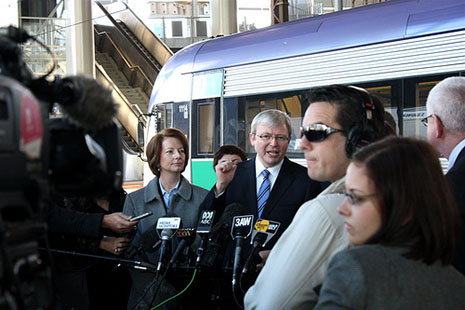THE SHARP and sudden collapse in public support for the Rudd government is a rare event in Australia’s usually gradualist political environment. It is also puzzling because the magnitude of the collapse seems out of proportion to its supposed causes.
No doubt support for the government has been weakened by decisions to shelve the emissions trading scheme, to warehouse asylum-seekers, to abandon the ill-prepared home insulation scheme, to cut promised child care places, to defend the wasteful schools building program and to impose the so-called super profits tax on mining companies. But the falls in support for the government and in approval for the prime minister, reported by both Newspoll and Nielsen, seem extraordinary given the government’s previously high popularity and its sure handling of the global financial crisis. Australians might have reason to be angry, but hardly so angry that they would consider ousting Labor after only one term in office.
Yet that is what the polls imply. Assuming that they reflect more than passing alienation, it seems worthwhile to consider why the collapse has occurred and whether the government can recover to win a second term of office later this year.
The answers will be qualified, but three preliminary observations seem in order. First, it is easier for a government to lose support than to recover it; second, there can be a wide gap between what people tell pollsters now and how they will vote later this year; third, the relationship between remorseless polling and public perceptions of government performance is quite uncertain – in other words, it’s not clear whether polls lead or follow voting intentions.
One currently popular reason advanced for the collapse of support for the government is the interaction between the prime minister’s personality and management style and the policy and administrative backflips mentioned above. In his formidable Quarterly Essay, Power Trip, David Marr has argued that Prime Minister Rudd is not what he seems to be. The pleasantly nerdy God-botherer is also a foul-mouthed control freak carrying a deep well of anger and rage from searing childhood experiences. It is a sobering and well-supported assessment, the subject of frequent Canberra whispers.
But anger does not seem to have produced the backflips now eroding support for Rudd’s government and approval for his prime ministership. They seem rather to be rational, if regrettable, responses to political realities. Rudd realised the emissions trading scheme would be defeated in parliament; he responded opportunistically to the opposition’s campaign to whip up hysteria about asylum seekers. The government quite reasonably dared not risk a continuation of its poorly prepared home insulation scheme, but it retained the stimulatory school-building program while appointing an inquiry into cost and waste allegations. Again, political prudence rather than personal anger seem to have driven Rudd.
Nor is there evidence that Rudd’s stance against the alarmist campaign by mining interests to defeat the so-called super-profits tax is driven by hatred. It is, rather, driven by his desire to ensure that Australians get a reasonable share of the returns for their exported minerals. He is hardly a wild radical frothing with class anger and hatred.
Rudd’s personal flaws certainly include micro-management, lack of consideration for others and a tendency to rage, as Marr argues. But his most damaging political flaw may be his tendency to overstate and overreach with goals and promises, and then to default to easier goals when things get tough. He is hardly the first prime minister to display these tendencies and it is widely accepted that his confrontation with the miners is partly motivated by his desire, or need, to show that he can hang tough against formidable opponents.
So can Rudd put himself and Labor back in a winning position electorally? Probably yes. Labor’s response to the global financial crisis was impressive; the minority Greens have gained more than the Coalition from the fall in support for the government and Green preferences will eventually flow back to Labor; opposition leader Tony Abbott has yet to establish political or personal capacity superior to Rudd’s. (Neither, in fact, inspires great confidence and Rudd seems to think the prospect of Abbott’s becoming prime minister is an asset for Labor.)
What is more the election campaign is yet to come and Labor will enjoy all the advantages of incumbency and superior funding. It is a safe bet that Rudd will have some sweeteners to attract voters back to Labor. Importantly, Rudd’s handing of the economic crisis was obviously superior to the tragic efforts of James Scullin’s government – the last one-term federal government – to ameliorate the effects of the Great Depression in 1931–32. Polls notwithstanding, the Rudd ascendancy is not yet past, although it is diminished by the prime minister’s personal failings. •




